|
What is causing a surge in HPV infections associated
with head and neck cancers in white men?
Will an HPV vaccine received at age 11 last long enough to protect women
in their 40s when cervical cancer tends to strike?
In the fight against HPV, Emory gynecologist Kevin
Ault is taking the long view.

Most cervical cancers are caused by two varieties of
HPV (human papillomavirus), and a vaccine approved
in 2006 can protect against both of them. Still, the
long-term effectiveness of the vaccine is unknown.
"Let's say a girl in her early teens, someone like
my daughter, gets the vaccine," Ault says. "But the
average age of diagnosis for cervical cancer in the
United States is the early 40s. The vaccine's shield
has to last for decades for it to actually protect
her against disease."
HPV itself is a wily adversary. Most people who
become infected with HPV do not know that they have
it. At least 80% of sexually active men and women
carry the virus at some point in their lives, but in
most cases, the immune system clears the virus from
the body.
Researchers have found that the virus hides in "crypts"
in the cervix, anus, tonsils, base of tongue, and
throat. More than 40 types of HPV can infect both
men and women. Two types, HPV-16 and HPV-18, have
been shown to cause cervical cancer, as well as most
anal cancers and some vaginal, vulvar, penile, and
head and neck cancers.
Ault is leading an NIH-funded study at Emory that
looks at how long vaccine recipients maintain
"immune memory." That is, how long does the immune
system stay ready to fight the virus after receiving
the vaccine? Study participants are healthy women
between the ages of 18 and 26, who will be followed
for three years. The research takes into account
women who have received two rather than the
recommended three doses of the HPV vaccine.
Ault says recent findings about the pertussis
vaccine may shed light on the long-term
effectiveness of the HPV vaccine. In the 1990s,
children in the United States began receiving a
newer version of the pertussis vaccine that had
fewer side effects than the original version.
Researchers at Kaiser Permanente recently showed
that immune protection fades faster with the newer
vaccine, waning substantially five years after the
last shot. They suggest that this lack of protection
may be a contributing factor in the largest reported
outbreak of pertussis in 50 years, which occurred in
2012.
"We wouldn't want people to rely on something that
lasts a relatively short time," Ault says. His study
will give clues on whether patients will need
periodic HPV booster shots, like those for tetanus.
Evidence is emerging that HPV infection also is
contributing to head and neck cancer. In a 2011
article published in Oncology, researchers at
Emory's Winship Cancer Institute reported a "surge"
in the past two decades of HPV-related tumors in the
tongue and tonsils, especially among white men. Part
of the increase is due to more sophisticated and
intentional ways of looking for HPV, says Emory
oncologist Jonathan Beitler.
"Ten years ago, it was not a perceived problem, but
our world has changed," he says. "This used to be a
disease of older men, smokers, and drinkers. Now we
are seeing patients who are younger and more
educated, without those traditional risk factors."
Beitler estimates that three-quarters of the
patients he sees with head and neck cancer have
HPV-related tumors. The surge may be connected to
increased practices of oral sex and/or marijuana
consumption. For example, having six or more oral
sex partners increases a person's risk of developing
head and neck cancer nine-fold, amounting to more
than the increased risk coming from smoking.
On a brighter side, patients who have HPV-related
tumors generally have better outcomes than those
whose tumors have a different origin. The survival
rates of these patients are higher, with five-year
survival rates of 75% to 80%, compared with 50% for
HPV-negative tumors.
The higher survival rates and younger patient
profiles mean that oncologists treating head and
neck cancer are trying approaches such as minimally
invasive surgery and drugs that may have fewer side
effects. "Our current challenge is figuring out how
to de-intensify therapy in the best way and still
cure the patient," Beitler says. "We want to make it
possible for patients to get back to their lives."
In a national clinical trial in which Beitler is
involved, researchers are comparing two anticancer
drugs to treat head and neck cancer in combination
with radiation.
One approach uses a standard DNA-damaging agent,
cisplatin, with the test drug, cetuximab, to block a
growth factor found on head and neck cancer cells.
The aim is to determine whether cetuximab can
provide the same level of efficacy with reduced side
effects, such as mouth sores.
The investigators also hope to learn about the genes
of the HPV varieties that contribute to activity in
head and neck cancer.
Beitler notes that HPV varieties may continue to
shift, indicating that vaccine studies like Ault's
could guide updates in vaccine practices for both
men and women.
[_private/vid/salute/HPV-Emory.htm]
For more information
Emory University
(MDN)
|